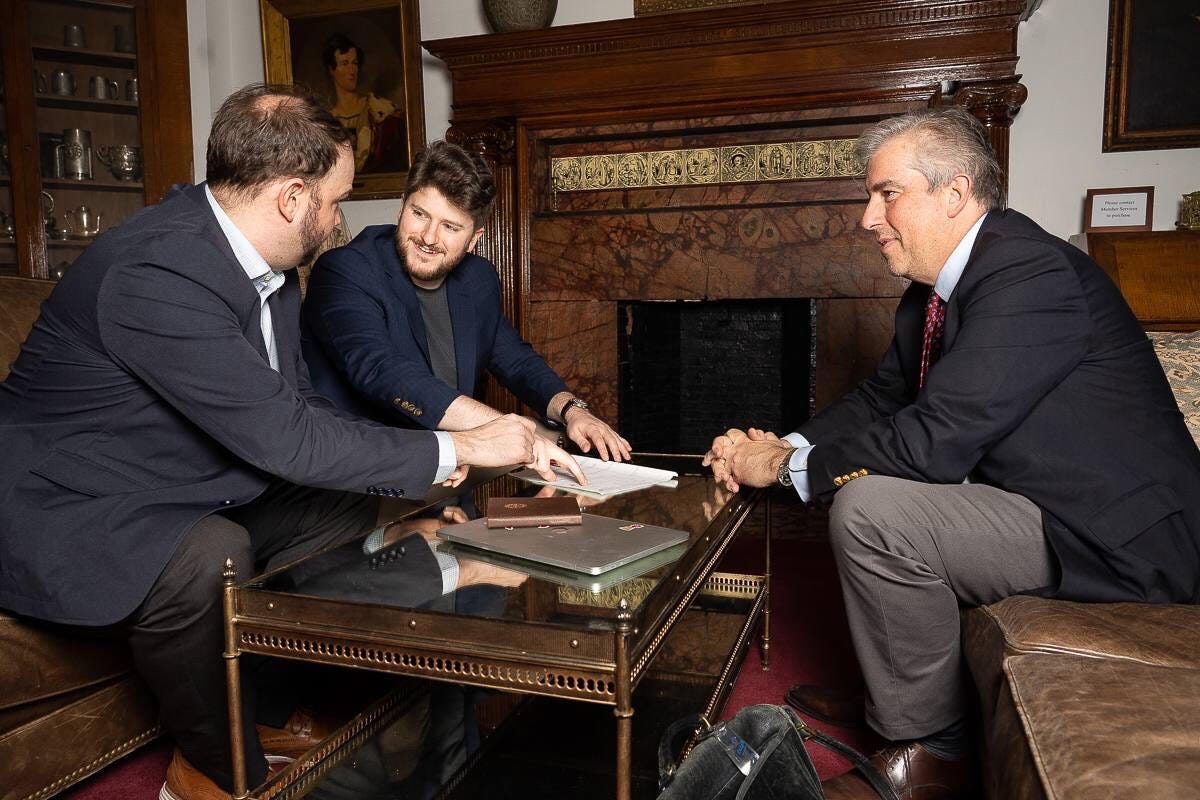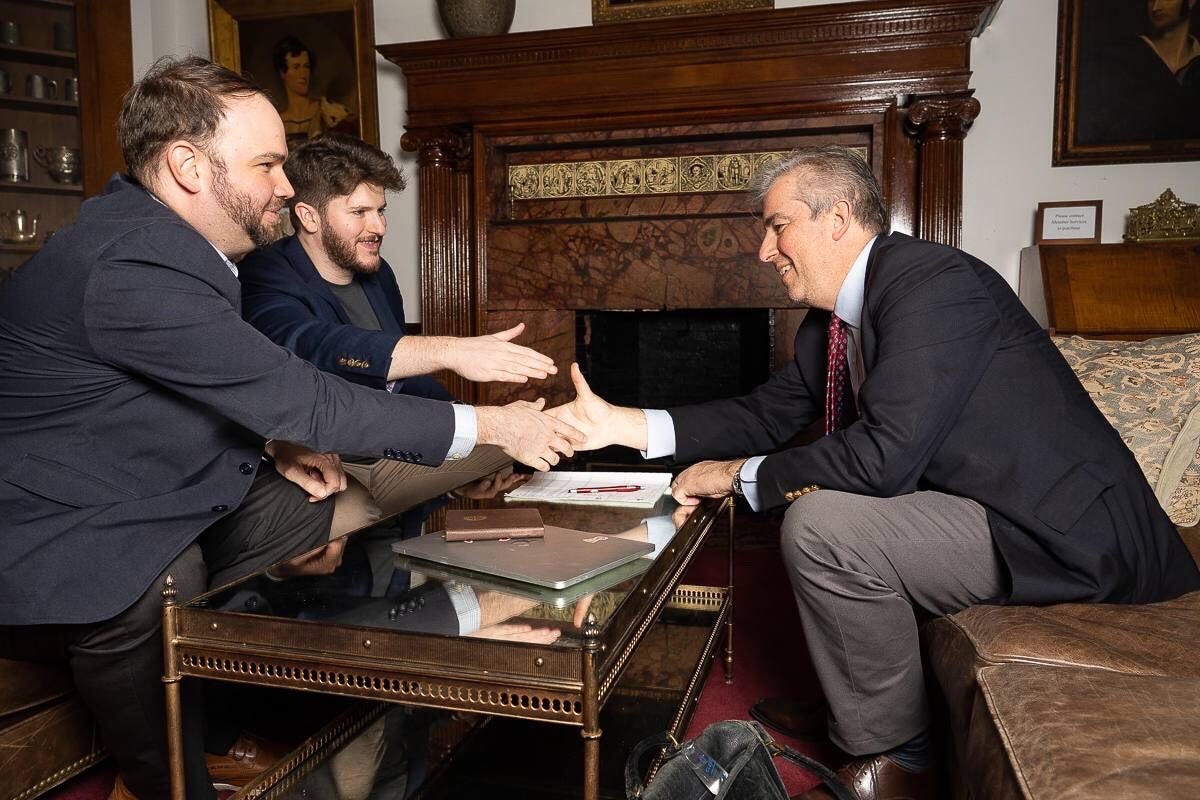A Message to Readers About 'The Emerging Populist Majority'
Gavin Wax and I Have Teamed Up to Write A Book That Elaborates on Some of the Themes and Issues Written About on this Space
This week Gavin Wax and I finalized a book deal with Post Hill Press. For the past many months we’ve been working on ‘The Emerging Populist Majority’ and talking to various publishers. It came together faster and more efficiently than even the optimistic side of myself could have imagined. Since at least my early 20s I’ve been wanting to publish a book one day, and to update this impulse into my 30s — I guess I’d like to author and co-author at least six.
Writing is a hard thing. Sometimes it works, sometimes it doesn’t. The only way to get good or better at it is the same way you do anything in this life — over and over again. In part, this space and prior writings, commentary, and podcasts have helped build to this point and whoever has read that old site or the various articles and newsletters I’ve put out here in the past eighteen months or so — thank you for reading, and please continue. The format and pace of writing may shift from time to time, and eventually I’m hoping to host some guest writers and interviews, and build out some special features, but I’ll try and stick to regular content and if I slip, it’s probably because I’m writing something longer.
A few more words about this Substack before answering a few questions I’ve received this week since the announcement.
More than likely the pace will pick up here in the lead up to the release of ‘The Emerging Populist Majority’ and increasingly take on a journalistic tone, shining a light on stories the corporate and legacy media will not cover. While I am no journalist, that does not matter — because professional journalism is dead. Anyone can be a journalist and have a voice and increasingly the biggest check on runaway tyranny and concentrated power will be a fleet of citizen journalists.
Periodically, I’ll do the Newsletter where multiple topics are covered and then other times I’ll focus in on a singular topic. I hope to continue to cover American political history told the presidential administrations and geography and state history through the fifty states that make up our United States of America. Increasingly, some of the better and more succinct written pieces will not end up here, but rather be submitted as op-eds from time to time, especially if topical.
But make no mistake — I will never, ever, make anyone pay for content here. I’ll accept donations if you’d like to donate, and that is set up only because some started to come in.
What you read here may very well find its way in parts into the next book that I’ve already started, but more on that to come. What will be in The Emerging Populist Majority?
In short it’s one of the three major areas covered here: American Political Realignment. The history of it, the confusion around it, the battle over its history, and the nature of party coalitions in our two major parties, the trends, and much more. While we certainly have a perspective and worldview, the book is far heavier on analysis and what-is, already-has-been, and what could-be than on commentary and what should-be.
Will there be an audiobook?
Yes. We are definitely recording audiobook versions and this is the most common question I have gotten in person or through messages.
Will there be translations?
Yes. Stay tuned.
Will there be book events?
Yes. Without getting into particulars we will be doing as many book events as we can fit in as part of the promotion. We will also be doing as many media and podcast appearances as we can, including starting our own podcast. Details on that to follow.
What is populism?
There are many definitions of populism, but for purposes here I’ll use my own preferred definition. The political values and aspirations of ordinary people and a politics that represent the interests of middle and working class people. I consider populism to be one of America’s two movement-based ideologies throughout our history, along with progressivism. Populism can be either liberal or conservative although it cannot be moderate or status quo, pro-establishment or pro-elite. Populism and elitism are polar opposites from one another.
Am I a populist?
Yes. I consider myself to be a populist of some variety. That being said I am aware to some of you my politics will appear to have changed over the course of the last decade or so. And while that is not relevant to this actual book because of its analytical, political science, and historical nature, I have no problem talking about it in greater detail elsewhere.
My true north, my Polaris politically is and has always been tied to these four main ideas:
1.) anti-authoritarian
2.) anti-war (of choice, I acknowledge there are some necessary wars, but they are rare in my view)
3.) pro-working and middle class on economics and in society
4.) very patriotic
But isn’t populism authoritarian?
No. While every political philosophy is capable of authoritarian tendencies and some are more associated with those tendencies historically, populism is not authoritarian. To be truly authoritarian you have to be in charge and populists are rarely in charge and almost never are political insiders. Rather, elites say it is authoritarian because they are diametrically opposed to it, just as populists say elites are authoritarian and in the case of today’s elites in America—increasingly totalitarian. Another group that tends to dislike populists are so-called “public intellectuals” and “experts.”
What do you have against intellectuals?
I think elites, intellectuals, and rule by experts is perfectly fine if a civilization and society is seeing good outcomes from their stewardship. However, in our recent history and over most of our lifetime America has been in a real and relative decline, and this is in part because of a failure of public leadership from our societal elites, intellectuals, and experts. In the 1950s America saw much better stewardship from the leaders of the day. Whether this failure in leadership is because of incompetence, intentional, or a mix of both is no matter. The facts are ordinary Americans are getting squeezed and screwed over. And our difficult times call for a deep interventions and reforms that rally around the few things in American life that do still work and most importantly, from the historical memory and time-tested experiences of our ancestors.
Aren’t you an intellectual?
No. I do not consider myself an intellectual. But I realize what you consider yourself is not always how others will see you.
At the end of the day, while there is a set of public policy issues I associate with modern American populist movements and the specific populism I prefer, I consider populism to be much more a style than a set of policy prescriptions. And it is a style that is gaining in American life and will keep gaining because of elite and establishment failures and mismanagement, and an elite-driven, top-down ideology that is not shared by enough Americans to be electorally viable going forward.
I teamed up on this with Gavin Wax for a very specific reason. Because he represents in his life story and personal politics a very good cultural stand-in for the type of urban populism that if combined with rural populism will dominate American politics for the better part of this century. We both think America is in rough shape right now, and that civilization generally is, yet we both remain steadfastly patriotic and happy warrior-ish in our perspective and committed to the idea that life can be improved and the country can see a national and civic renewal.
Gavin grew up in Queens and represents the chip-on-your-shoulder hustle of urban populism. I grew up in a small town and represent the chip-on-your-shoulder mentality of small town middle America and rural populism.
My weaknesses are his strengths, and I think we’ll make a good team for both publisher and our own benefit as this book gets closer to being a reality.
I think that this book has something in it for everyone that is politically-obsessed or even if you despise politics, just deeply care about what is going on in America today, which extends to the international realm as well. The authors, books, and people referenced in it represent a broad spectrum of American politics past and present.






